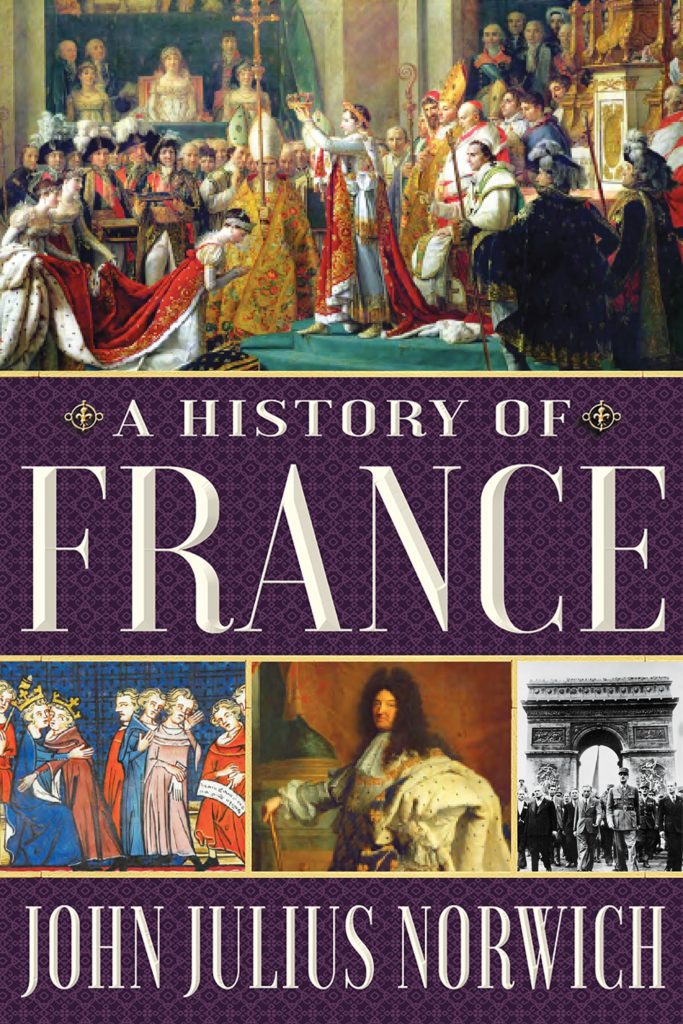Reviewed by Kitty Kelley
A streamlined, merry romp through glorious Gaul.
Imagine you have an 88-year-old grandfather who lives in London and is crossing the pond to tell you about his newest book. Besotted by all things French, he intends to take you from Gaul to de Gaulle in 400 pages, and your mother insists you givehim respectful attention. After all, he’s written 23 history books, edited 11 more andnarrated 30 television documentaries. He’s also hosted the BBC Radio game show,“My Word!”
On top of that, he’s a viscount, a British title that confers immense prestige on a man,who gets to be addressed in the U.K. as “Lord.”
So now you’re prepared for John Julius Norwich and “A History of France,” the viscount’s valentine to Francophiles.
He indicates this may be his last book. Sadly, he’s right. Norwich died this year, a few months after its publication. He ended his French history at 1945, leaving the Fourth and Fifth Republics to another chronicler.
Norwich begins the preface with the first words Charles de Gaulle wrote in hismemoirs: “Toute ma vie, je me suis fait une certaine idée de la France.” (“All my life, I have had a certain conception of France.”)
Lest you think the author identifies with “Le gran Charles,” be assured that heapplauds him as “one of the greatest men in all [French] history,” but lambastes himfor “almost unbelievable pusillanimity and small-mindedness.”
Being the son of Duff Cooper, for whom the title Viscount Norwich of Aldrich in the County of Sussex was created in 1952, the author casually drops the names of de Gaulle and Winston Churchill, men he had met through his father when he was a teenager.
He recalls meeting de Gaulle at a commemorative luncheon on the third anniversary of the D-Day landings. Young Norwich had arrived late after all the plates werecleared, except for de Gaulle’s plate of apple pie, into which he was tapping hiscigarette ash. The hungry young man asked the general if he might have his dessert, and the general immediately pushed the plate over, apologizing for the ashes.
Norwich writes: “I said that it would be an honor to eat the general’s ash — a remark that proved a distinct success. It was my only conversation with the great man; but unlike most of those he had with my father or Winston Churchill it couldhardly have been more friendly.”
The author’s preface becomes even more intriguing when he mentions spendingChristmas 1944 in the British embassy in Paris, where his father was serving as ambassador. There, the young man meets the poet Louise de Vilmorin, “my father’s mistress,” whom, he claims, “my mother loved … almost as much as my father did,” adding that his mother, Lady Diana Cooper, “had no conception of jealousy” about his father’s many lovers.
And we’re still only in the preface!
If you’re as curious as I was, you might be tempted to Google Duff Cooper, whom you’ll find described by London’s Telegraph as “a legendary womanizer” whose “many … early liaisons left his wife in tears but as his health failed, she acceptedthem.”
In addition to the aforementioned poetess, these liaisons included Singer sewing machine heiress Daisy Fellowes, socialite Gloria Guinness, fashion model Maxime de la Falaise and writer Susan Mary Alsop, with whom Cooper had an illegitimate son.
Now the author’s family history is looking as interesting as any of the 58 French kings he writes about, including Charlemagne, with his “five legal wives and four supplementary spouses.” I confess: I ran to Google again to learn that“supplementary spouses” are “an important but often unrecognized relationship” ina marriage, rather like the third leg of a tripod.
After reading the preface, one almost wishes Norwich had written his own memoir and left the history book to French scholars. He states that he did not write his book for professional historians, and certainly none would nominate him for a Pulitzer.
He breezes through the Crusades in a few pages, dusting off two centuries’ worth ofbattles, from the Fall of Jerusalem to the Fall of Constantinople. Along the way, he introduces a variety of regents, from Clovis I to Napoleon III — with every Louis from I to XVIII in between — plus an odd duck named Dagobert I, who wore histrousers inside out. (Why? We’re not told.)
You may have difficulty keeping separate “King of Franks,” “King of France,” “King of the French” and “Emperor of the French,” but, remember, you’re getting yourhistory in one drive-by gobble rather than in dainty little sips.
You can’t help but be amused as you meet various kings, including Robert the Pious (liked to pray), Philip the Amorous (excommunicated for adultery), Louis the Fat (weighed a lot), John the Posthumous (lived just five days), John the Fearless (loved waging war — but, then, all French kings did), Charles the Bold, Philip the Fair and Philip the Good (founded the Order of the Golden Fleece).
You’ll appreciate the author’s Oxford credentials when he writes that King John of England “was responsible for the murder” of his nephew, Prince Arthur of Brittany,which, Norwich adds, provided “Shakespeare with one of his most poignant scenes.”
Far be it from me to question an esteemed viscount, but I was startled to read that when St. Denis, third-century bishop of Paris, was beheaded, he “calmly picked up his severed head and walked several miles to the site of the abbey that bears hisname while preaching a sermon on repentance.” No documentation, but in a slyfootnote, Norwich quotes Madame du Deffand: “It’s the first step that counts.”
Regarding Madame: Again, consult Google and then — ça alors! — continue yourmerry romp through “A History of France.”
Georgetown resident Kitty Kelley has written several number-one New York Times best-sellers, including “The Family: The Real Story Behind the Bush Dynasty.” Her most recent books include “Capturing Camelot: Stanley Tretick’s Iconic Images of the Kennedys” and “Let Freedom Ring: Stanley Tretick’s Iconic Images of the March on Washington.”


